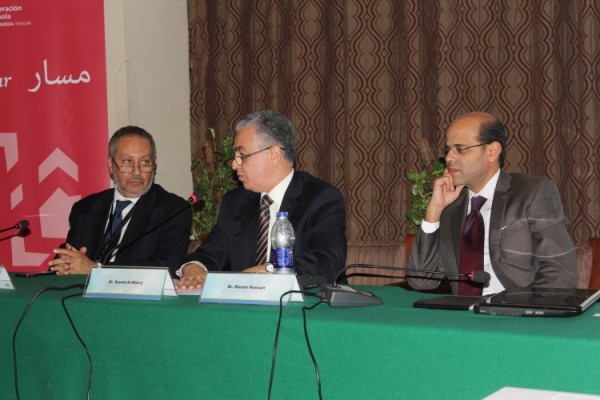BY ALAA EL DIRINI AND HANA ISKANDER
@ALAADIRINI & @HANAISKANDER92
![Baseera Director Maged Osman, far left, says polling empowers the citizenry. He is flanked by moderator Saeed Al-Masry and researcher Mazen Hassan [Azmy]](http://www.auccaravan.com/wp-content/uploads/2015/11/IMG_0656-e1446884179203.jpg)
A survey conducted by the Egyptian Center for Public Opinion Research – Baseera – just six days before the first round of parliamentary elections in October revealed that 85 percent of eligible voters had no information about the candidates or the parties running.
“The parties need to represent the people more effectively,” said researcher Mostafa Refaei during Baseera’s conference on ‘Public Opinion and Transition to Democracy’ held at the Tahrir campus last week.
Part of Refaei’s polling of trends toward political participation focused on how public perceptions changed between 2010 and the post- uprising phase. He divided his research between official (elections and referenda) and unofficial (demonstrations and protests) channels of participation.
“Official political participation increased dramatically after 2011,” he said during his lecture ‘Political Participation in Egypt: Perceptions and Practice.’
Before the January 25 uprising, 46 percent of eligible voters participated in elections and referenda, but this figure surged to 85 percent after 2011.
His polling revealed that only two percent of the public participated in the political process through demonstrations and protests
prior to 2011.
This increased to 11 percent between January 2011 and July 2012, and further increased to 19 percent in July 2013, before retreating to 8 percent in 2014.
Refaei’s research showed that the highest rates of protest happened during the rule of former President Mohamed Morsi (2012-2013).
But when examining the low voter turnout in the first round of parliamentary elections earlier this month, Refaei believes that: “the media has to rehabilitate citizens, and simplify the electoral procedures to help them understand the candidates› platforms.”
Polling as a democratic tool
Established in April 2012 in the aftermath of the January 25 uprising, Baseera is an independent and non-partisan organization that conducts public opinion polls that follow ethical and professional standards. It is committed to providing researchers, policy makers, business leaders, and the general public with reliable information on public trends.
Baseera CEO and Director Maged Osman told The Caravan that the role of the national pollster is to empower the citizenry politically, economically and socially.
“You must enable the Egyptian citizen to be able to acquire information, there must be permanent representatives to play this role,” he said.
“We need to empower citizens by information. It is not enough to monopolize information production by government, we need to have constant access to play that role, especially when it comes to educators related to governance, to anti- corruption, to accountability,” Osman added.
“I think the government needs to think about this seriously because they need to have a component that is addressing communication with the people,” Osman concluded.
The conference, which was co-organized with AUC’s journalism and mass communication department in cooperation with international research project ArabTrans, and the Spanish Agency for International Cooperation and International Development (AECID)/Masar Citizenship, heard from a number of guests on the issue of political transformation.
During his lecture on the challenges and opportunities during times of transition, Ibrahim Awad, the director of the Center for Migration and Refugee Studies at AUC said that gathering statistical information was an imperative toward interpreting public opinion.
“The more information about the people and their views you gather, the easier it is to understand public opinion in the light of economic and political conditions of the community,” said Awad.
“There must be political upbringing for political participation to succeed, without the information on people the role of institutions will not be effective,” Awad added.
While the percentage of Egyptians taking part in elections and referenda increased by 46 percent since 2011, Baseera pollsters found that only 28 percent of Egyptians believe that political participation has a ‘significant impact’ in government decisions. Some 24 percent believe that participation ‘does not affect’ decisions.
Bassera CEO Osman believes the government should think about the role of communications for future political engagement.
“Now people rely on social networking, and the government needs to reach people before they lose interest and confidence in it,” Osman told The Caravan.
“We need coordinators between the people and the government,” Osman said.
But some found the Baseera to be overly critical of the government›s role in the people’s political maturity.
Amira Khaleifa, advisor to the chairman of the Information and Discussion Support Center affiliated with the cabinet, said the media “wasn’t doing enough to give constructive criticism.”
“There is corruption in the government, however, there are positives and people who want to rebuild their country,” she said.
Walid Othman, Representative of Public Diplomacy for Middle East and North Africa in the Dutch Embassy says the media is providing data and information but the government has yet to take it all into consideration.
